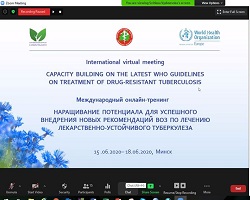Introducing new guidelines on the treatment of drug-resistant tuberculosis

To build capacity and assist countries in the operationalization of the latest WHO policy guidance on the treatment of multidrug- and extensively drug-resistant tuberculosis (M/XDR-TB), WHO and its Collaborating Centre for the Introduction of New Drugs and Regimens for the Treatment of M/XDR-TB with the support of the Green Light Committee for the WHO European Region (rGLC/Europe) conducted a training for health professionals.
The 4-day event on 15–18 June 2020 introduced health professionals from high-priority countries for TB control in the Region (Armenia, Azerbaijan, Belarus, Georgia, Kazakhstan, Kyrgyzstan, the Republic of Moldova, Ukraine and Uzbekistan) to new WHO guidelines on the clinical aspects of the treatment of M/XDR-TB as well as detection, drug management and pharmacovigilance.
Due to the COVID-19 pandemic, the workshop was organized online. It is one of the many webinars produced by the rGLC/Europe Secretariat to support countries and build national capacities.
Filling the gap
For many participants, including Dr Maria Dolynska from Ukraine, webinars such as these are opportunities to gather the latest information in an accessible format for application back in the workplace. “The webinar was extremely productive for filling the gap between evidence-based solutions and their application in a physician’s day-to-day work,” she noted.
About rGLC/Europe
rGLC/Europe was established to address the need for scaling up the programmatic management of M/XDR-TB in the Region. WHO/Europe is the hosting secretariat of rGLC/Europe. Regular meetings between rGLC/Europe members are held online.
Due to the challenges of the COVID-19 pandemic, WHO/Europe is organizing virtual meetings for rGLC/Europe members and extending invitations to major stakeholders to ensure capacity-building among national experts, transparency and accountability.
WHO/Europe and rGLC/Europe are planning to run more webinars dedicated to aspects of the programmatic management of M/XDR-TB.



